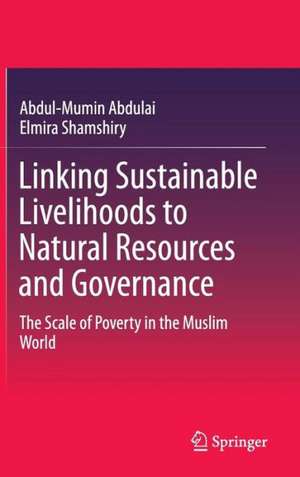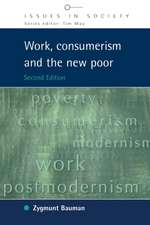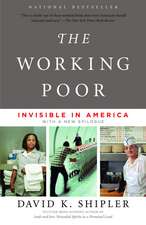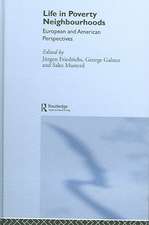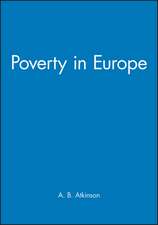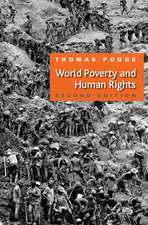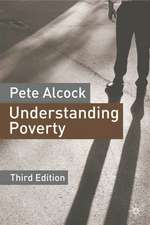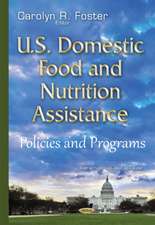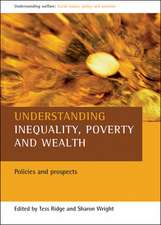Linking Sustainable Livelihoods to Natural Resources and Governance: The Scale of Poverty in the Muslim World
Autor Abdul-Mumin Abdulai, Elmira Shamshiryen Limba Engleză Hardback – 16 iul 2014
| Toate formatele și edițiile | Preț | Express |
|---|---|---|
| Paperback (1) | 383.93 lei 6-8 săpt. | |
| Springer Nature Singapore – 27 sep 2016 | 383.93 lei 6-8 săpt. | |
| Hardback (1) | 391.22 lei 6-8 săpt. | |
| Springer Nature Singapore – 16 iul 2014 | 391.22 lei 6-8 săpt. |
Preț: 391.22 lei
Nou
Puncte Express: 587
Preț estimativ în valută:
74.87€ • 77.88$ • 61.81£
74.87€ • 77.88$ • 61.81£
Carte tipărită la comandă
Livrare economică 14-28 aprilie
Preluare comenzi: 021 569.72.76
Specificații
ISBN-13: 9789812870520
ISBN-10: 9812870520
Pagini: 224
Ilustrații: XXIV, 198 p. 19 illus., 6 illus. in color.
Dimensiuni: 155 x 235 x 18 mm
Greutate: 0.49 kg
Ediția:2014
Editura: Springer Nature Singapore
Colecția Springer
Locul publicării:Singapore, Singapore
ISBN-10: 9812870520
Pagini: 224
Ilustrații: XXIV, 198 p. 19 illus., 6 illus. in color.
Dimensiuni: 155 x 235 x 18 mm
Greutate: 0.49 kg
Ediția:2014
Editura: Springer Nature Singapore
Colecția Springer
Locul publicării:Singapore, Singapore
Public țintă
ResearchCuprins
Preface.- Acknowledgement.- List of tables.- List of figures.- List of boxes.- Chapter 1: Introduction.- Chapter 2: Theory and practice on poverty - Natural resources and governance.- Chapter 3: Techniques and methods used to investigate muslim world's poverty.- Chapter 4: The incidence and trend of poverty in the muslim world.- Chapter 5: Natural resource endowments and development trend in the muslim world.- Chapter 6: Governance and poverty alleviation in the muslim world.- Chapter 7: Zakat as policy tool to reduce poverty and improve livelihoods.- Chapter 8: Addressing pertinent development questions in the muslim world.- Chapter 9: Toward a practicable development collaboration.- References.
Notă biografică
Abdul-Mumin Abdulai holds a Bachelor’s degree in Geography and Resource Development with Sociology from the University of Ghana, Accra-Legon, (1997-2000), Master’s degree in Sociology and Anthropology from International Islamic University Malaysia (2004-2006), and Doctorate degree in Environment and Development (2007-2010) from the Institute for Environment and Development, National University of Malaysia/Universiti Kebangsaan Malaysia (UKM). His research interests include livelihoods sustainability, natural resource utilization, poverty and inequality issues and environmental governance. He is currently a Visiting Research Fellow at the Institute for Environment and Development, National University of Malaysia/Universiti Kebangsaan Malaysia (UKM).
Elmira Shamshiry obtained her Bachelor’s degree in Environmental Engineering (Natural Resources) from the University of Shahid Chamran, Ahvaz, Iran (2001-2005), Master’s degree in Environmental Science from University Putra Malaysia (2007-2009), and Ph.D in Environment and Development (2009-2013) from the Institute for Environment and Development (LESTARI), National University of Malaysia/Universiti Kebangsaan Malaysia (UKM). Her research interests include environmental sustainability, modelling, waste management and natural resources engineering. She is currently a Postdoctoral Research Fellow at the Institute for Environment and Development, National University of Malaysia/Universiti Kebangsaan Malaysia (UKM).
Elmira Shamshiry obtained her Bachelor’s degree in Environmental Engineering (Natural Resources) from the University of Shahid Chamran, Ahvaz, Iran (2001-2005), Master’s degree in Environmental Science from University Putra Malaysia (2007-2009), and Ph.D in Environment and Development (2009-2013) from the Institute for Environment and Development (LESTARI), National University of Malaysia/Universiti Kebangsaan Malaysia (UKM). Her research interests include environmental sustainability, modelling, waste management and natural resources engineering. She is currently a Postdoctoral Research Fellow at the Institute for Environment and Development, National University of Malaysia/Universiti Kebangsaan Malaysia (UKM).
Textul de pe ultima copertă
This book investigates the current level and trend of poverty in the Muslim World, including selected countries in Africa, the Middle East and Central Asia, East Asia, the Pacific and South America. Authors explore themes of poverty reduction, the extent of natural resource endowments (especially mineral resources) and the influence on social and economic development.
Chapters explore theory and practice, including governance and programmes, and take a detailed look at Zakat as a faith-based policy tool, to reduce poverty and improve livelihoods and thus contribute to better environmental stewardship. The final chapters look at development questions in the Muslim World and make policy recommendations, including a proposed multi-dimensional development collaboration model called the Development Collaboration Octagon Model (DeCOM).
Readers will discover theoretical explanations of poverty and how poverty hampers the development of many nations because the poor are unable to partake actively in the development process. Poverty indicators and measurement are discussed, and trends of economic growth including productivity, manufacturing, trade patterns, investment and saving activity are all explored: supporting data is presented in tables and figures, throughout this text.
Authors explore the potency and success stories of public poverty alleviation strategies and programmes pursued in the Muslim world, especially the extent to which the institution of Zakat has been effectively incorporated into public poverty alleviation strategies. Policy options required to enhance social and economic development are proposed, to help pull the poor out of the poverty trap into the mainstream economy in theMuslim world.
This work will appeal to anyone wishing to scrutinise poverty, its parameters and its relationship with the development of countries in the Muslim world. Scholars in the fields of economics, sociology, geography and Islamic studies will all find something of value here.
Chapters explore theory and practice, including governance and programmes, and take a detailed look at Zakat as a faith-based policy tool, to reduce poverty and improve livelihoods and thus contribute to better environmental stewardship. The final chapters look at development questions in the Muslim World and make policy recommendations, including a proposed multi-dimensional development collaboration model called the Development Collaboration Octagon Model (DeCOM).
Readers will discover theoretical explanations of poverty and how poverty hampers the development of many nations because the poor are unable to partake actively in the development process. Poverty indicators and measurement are discussed, and trends of economic growth including productivity, manufacturing, trade patterns, investment and saving activity are all explored: supporting data is presented in tables and figures, throughout this text.
Authors explore the potency and success stories of public poverty alleviation strategies and programmes pursued in the Muslim world, especially the extent to which the institution of Zakat has been effectively incorporated into public poverty alleviation strategies. Policy options required to enhance social and economic development are proposed, to help pull the poor out of the poverty trap into the mainstream economy in theMuslim world.
This work will appeal to anyone wishing to scrutinise poverty, its parameters and its relationship with the development of countries in the Muslim world. Scholars in the fields of economics, sociology, geography and Islamic studies will all find something of value here.
Caracteristici
Provides a comparative analysis of development issues in the Muslim world Examines the irony of poverty amidst abundant natural resources in the Muslim world Discusses the current trend of poverty in the Muslim world, the causes and solutions Explores the poverty alleviation potency of Zakat—a faith-based poverty alleviation blue-print Discusses the enabling role of good governance in poverty alleviation Includes supplementary material: sn.pub/extras
